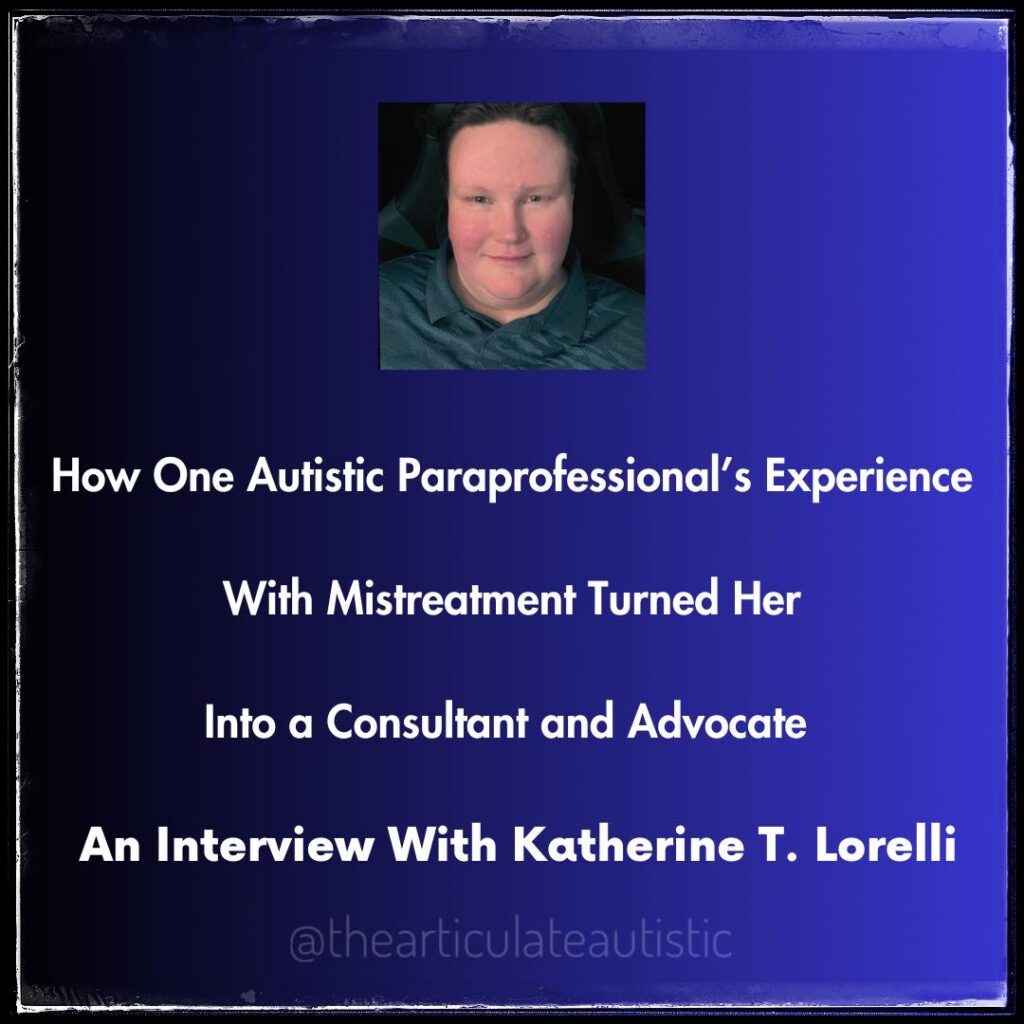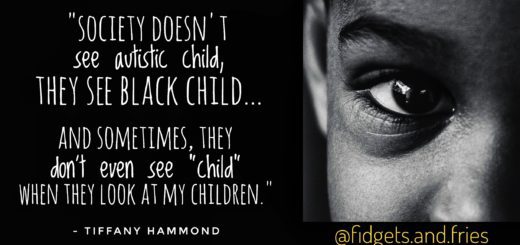How One Autistic Paraprofessional’s Experience With Mistreatment Turned Her Into a Consultant and Advocate – An Interview With Katherine T. Lorelli

Katherine T. Lorelli used to be a paraprofessional with a dream of helping autistic children access their education through neurodivergent-friendly modification and support. She went into the field with the hope that her own neurodivergent (autistic/ADHD) brain would be a strong asset, allowing her to provide a combination of support and education to the neurotypical teachers she worked with.
Unfortunately, this is not the way things worked out. Instead of utilizing Katherine’s lived experience as a neurodivergent person, the teachers who employed her were offended by her attempts to bring a more neurodivergent-friendly experience to their students–and they showed their displeasure by ostracizing her, ignoring her suggestions, and undermining her plans.
They even went so far as to write her up multiple times for things her neurotypical co-workers were never reprimanded for!
In addition to creating a toxic work environment for Katherine, some of the special education teachers also mistreated their students; focusing all their energy on holding to rigorous and harmful behavior plans instead of treating them as individuals; valuable human beings who needed understanding and modifications to learn effectively and work toward achieving independence.
Over time, Katherine became disheartened by the roadblocks in the way of her changing the lives of her students for the better, so she moved out of the school system and into private consulting.
In this interview, she details her experiences and explains what she can do to help you as a teacher or parent who works with and/or cares for autistic children.
Jaime A. Heidel: As an autistic/ADHD paraprofessional, in what ways were you treated differently than your colleagues?
Katherine Lorelli:
“My co-workers were always part of the team, whereas I was always left out. I wouldn’t be included in team meetings or conversations about the students, even the ones I was working with.
Also, teachers would go to every other paraprofessional but me to work with a new student, but those paraprofessionals were like the teachers I worked with in that they practiced ABA (applied behavior analysis).
That wasn’t my tactic, and I wouldn’t purposefully subject my students to things I knew, as an autistic person, would be torture to them. Because of this, the teachers and paras would let me know, in subtle ways, that they weren’t OK with my methods, and they slowly began to make every day on the job more and more difficult.
Even though I didn’t follow through with harmful behavior plans, I did try to talk to the teachers and tell them what I thought would work best for the students, but instead of trying my suggestions, I was written up for insubordination.”
Even though I didn’t follow through with harmful behavior plans, I did try to talk to the teachers and tell them what I thought would work best for the students, but instead of trying my suggestions, I was written up for insubordination.
Kt Lorelli – Neurodivergent Consultant & Mentor
Jaime: Can you give me an example?
Katherine:
“Sure. I had a student we’ll call Seth. He’s non-speaking and was given an AAC (augmentative and alternative communication) device to communicate. I could tell from a short time working with him that he had no interest in the device and wouldn’t be using it, and I told his teacher as much.
I meant this literally. I could tell he wouldn’t use it and that trying to get him to would just frustrate and confuse him. I wasn’t trying to be negative, but that’s how it was received, the teacher treated it as insubordination because the AAC device was part of his behavior plan, so he was expected to use it.
My goal was to work towards finding a communication method that did work for him, but I was told that I had to do whatever the teacher told me without question–and I was written up for non-compliance.”
Jaime: Ah, the strict adherence to social hierarchy! I’ve had plenty of bad experiences with this, too. Did the teacher you worked with know you were autistic?
Katherine:
“Yes, I told her pretty early on with the hope that it would make her more understanding of my literal way of thinking and direct way of communicating. It actually did the exact opposite. The teacher used the information to purposefully gaslight me as payback for doing what she saw as questioning her authority in regards to the students.”
Jaime: Can you elaborate?
Katherine:
“Instead of her seeing me as someone she could work with to understand the students, she treated me like I was beneath her. I’ve always needed a little extra help understanding the clerical side of my job–the paperwork, and she would take the time to patiently show me.
As soon as I told her I was autistic, however, she would give me directions, I would do exactly as she told me to do it, and she’d tell me I did it wrong. Then, I’d ask her to show me again, I’d do it exactly that way in front of her, and she’d say it was right. But when I turned it in at the end of the day, she’d still say I did it wrong.
Because she thought I was threatening her authority, she started making me question my own sanity, and this went on for months.”
Jaime: I’m so sorry that happened! What other roadblocks did you encounter as an autistic person working in the public school system?
Katherine:
“I also worked directly with behaviorists who were creating and implementing the harmful behavior plans, and when I would try to explain that what they were doing was harmful and why, I was met with the same resistance. I was even told once, and I quote, “Do your job. You’re not paid to think!”
Another really messed up thing the teachers used to do was to suddenly start being friendly with me, which gave me a false sense of security that things were finally turning around. They’d even ask me for advice, and I’d eagerly give it only to find out that they were taking credit for the ideas while still talking about me behind my back and trying to get me fired!”
Jaime: Yuck! I’m so sorry you had to deal with that. I’m almost afraid to ask but, in what way did the teachers you worked for misunderstand the autistic students?
Katherine:
“The first thing that comes to mind is the ‘planned ignoring’. If you don’t know what that is, it’s literally written into their behavior plan to purposefully ignore anything that’s considered an unwanted behavior such as anxiety.
I had a student, we’ll call him Lou, who would get off the bus every day absolutely terrified to walk into the building. I’d go out there and talk with him, let him vent about his fears, and reassure him that he would be OK for as long as it took to get him to come inside. It usually took 20 to 30 minutes of gentle coaxing and reassurance to get him to walk into the building with me.
Once he was inside the classroom, I was told that we had to ignore his questions and concerns because he was perseverating, and talking about it would only make it worse. This wasn’t the case. When I talked with Lou and helped him through his fears, he would calm right down and do his classwork. The other paras and teachers, however, would just study him and take data on his behaviors, offering no comfort or connection.

Perseverating isn’t something an autistic child can help, but there are accommodations that can be put into place to make it easier for the child to manage their anxiety. In this case, Lou needed to talk out his feelings before he could move on with his day. He desperately needed reassurance, but instead, he was ignored, and his behaviors frequently escalated to meltdowns.
Another thing they misunderstood was the need for stim toys (sensory aids). The teachers saw them as distracting and pointless and would not let the students use them in the classroom. Not being able to use these aids caused severe anxiety and made it impossible for the students who needed them to concentrate on their work.
One time, I even witnessed a teacher throw a child’s sensory aid right into the trash in front of him, resulting in that child having a meltdown. I fished it out of the trash, cleaned it, and gave it back to the student.
I got written up for that.”
“One time, I even witnessed a teacher throw a child’s sensory aid right into the trash in front of him, resulting in that child having a meltdown. I fished it out of the trash, cleaned it, and gave it back to the student. I got written up for that.”
KT Lorelli – Neurodivergent Consultant & Mentor
Jaime: Wow! You got written up for comforting your autistic student? It seems like they were fond of writing you up. What other things did you get written up for?
Katherine:
“Oh, let’s see, making suggestions, providing or giving back sensory aids that were taken away, asking questions, having to have clerical tasks explained to me more than once, refusing to follow harmful behavior plans, being direct about what I thought wouldn’t work for a student, having a “bad attitude”, and using the bathroom.”
Jaime: Using the bathroom?! Were you going 100 times a day or something?
Katherine: “Nope. Just once when my students were on their 15-minute breaks.”
Jaime: So, once each break? That sounds reasonable.
Katherine: “No, once a day. Just one time a day.”
Jaime: And they wrote you up for that?
Katherine: “Yep.”
Jaime: They really wanted to drive you out of that school, didn’t they? They did not hold back AT ALL!
Katherine: “They did not.”
Jaime: OK, just a few more questions. What mistakes did you witness the teachers you worked with make when working with their autistic students?
Katherine:
“There were a few things I noticed that would happen almost every day that stood out to me. One was chronic corrections.
For example, a teacher or a para would watch a student and point out every move they made with a question. “Lou, why are you looking around? Lou, what are you tapping your fingers? Lou, why are you humming? Lou, why is your shoe untied?”
Their anxiety would go through the roof because they felt every single move they made was being judged, and it was!
Vague instructions were another one. Autistic people are literal thinkers, and you would think special education teachers would know this and adjust the way they spoke to their students accordingly, but that wasn’t the case.
I’ll give you an example: Let’s say one of the student’s shoes was untied. The teacher would just keep repeating, “Lou, your shoe is untied. Lou, your shoe is untied” over and over, louder and louder, distressing and confusing the student.

I’d pipe up with, “Lou, tie your shoe. It’s untied.” He would do it right away, and the teachers acted as though I had magic powers or something. No, I’m being direct and telling the student exactly what I expect of him instead of making a vague statement.
This is another one I’ll never forget. I was working with a child in cooking class, and the teacher asked him to go around, collect all the eggs, and throw them out. (This is the non-speaking child who didn’t understand how to use the AAC device that I talked about earlier.) Before I realized what he was doing, so I could redirect him, Seth had proudly gathered all the eggs, full or cracked, in the carton or out, and tossed them all in the trash with a wide grin on his face.
The teacher wasn’t specific enough for Seth to understand that she meant to throw away just the cracked eggshells, and she proceeded to berate him until he was crying on the floor.
Another time, I saw a student standing in front of the classroom door, and a teacher, who wanted to walk out the door, said, “Excuse me” over and over again, but the student remained stationary, staring at her. The teacher threatened the student with detention if he didn’t do as he was told, but he wasn’t being told anything!
So, I piped up with, “Take two giant steps to the left.” He did it right away because he was told specifically what to do!“
Jaime: That makes perfect sense to me! I was always in the way as a child because people would say ‘excuse me’, but I didn’t know where to move to!
Katherine:
“Other mistakes that teachers made with their autistic students was getting frustrated and just doing the task for them, automatically assuming they wouldn’t be able to do it, calling out students for getting the wrong answer, writing up students for “talking back” when they were only pointing out factual errors or literally answering a question they didn’t know was rhetorical, and writing up students for natural autistic traits such as flapping, humming, using sensory aids, etc.”
Jaime: It actually scares me to know that teachers who are supposed to be trained specifically to work with autistic children don’t even seem to know the basics of autistic thinking, communication, and behavior!

Katherine: “It scares me, too. I feel terrible for them. There’s no reason for them to be misunderstood this way all the time.”
Jaime: Now that you’ve become a consultant, who do you work with, and how do you use your experience to help others?
“I work with teachers, parents, and neurodivergent teens and young adults.
For teachers, I focus on helping them work with their paraprofessional as part of their education team, to encourage and value their input and not just use them as glorified babysitters who ‘control’ the students as best they can until the bell rings.
For parents, I offer strategies that can help their children cope with challenging emotions, safer stims tailored to the individual child and their needs, and the peace of mind that comes from meeting their child where they’re at and embracing their child’s different brain instead of trying to change it.
For neurodivergent teens and young adults, I offer one-to-one mentoring to help them with self-esteem, self-advocacy, and life skills.”
Jaime: What is your educational background?
Katherine: “I have a Bachelor’s Degree from the University of Maine in Child Development and Family Relations with a background in psychology and working with autistic people.”



Working through fear is so important.
Comfort and connection are good.
And “take two steps to the left” instead of “excuse me”.
[the person saying “Excuse me” is usually the one who has to move around or away, in my experience].
“All the eggs” really does mean the whole egg/all the parts of the egg – not only the outside of it.